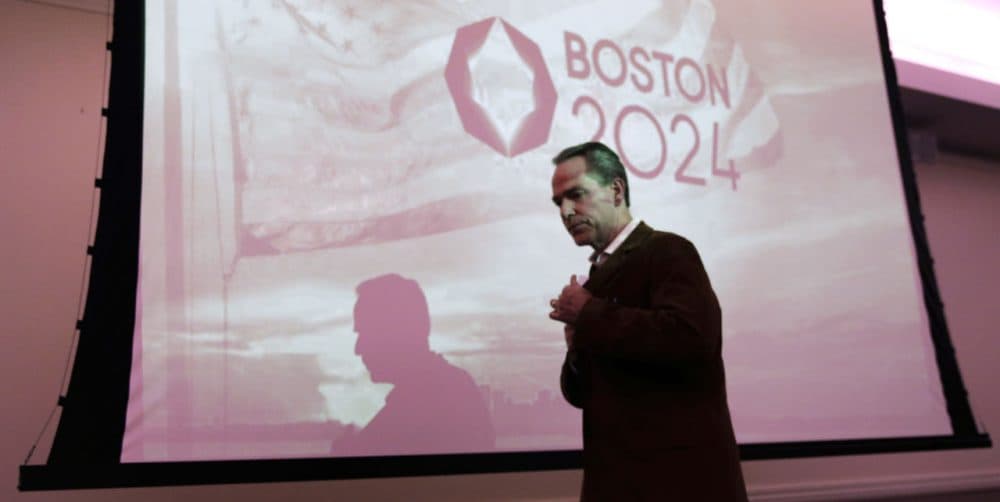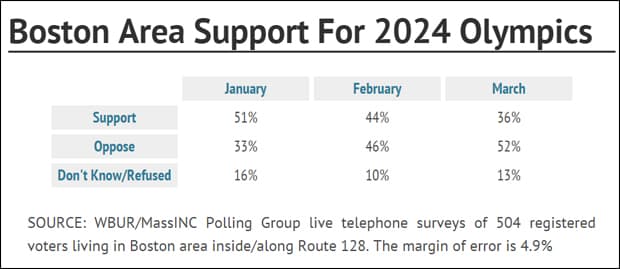Advertisement
Support For Boston Olympics Falls Further, WBUR Poll Finds
Resume
Support for holding the 2024 Summer Olympics in Boston has again fallen sharply, according to the latest WBUR poll.
A survey of 504 registered voters in the Boston area (topline, crosstabs) shows that 36 percent back the idea. That's down from 44 percent support in February and 51 percent backing in January.
The MassINC Polling Group's Steve Koczela, who conducted the live telephone survey March 16-18 for WBUR, said it's significant that Olympics support has continued to fall, even as the weather and operations of the MBTA, the area's public transit system, have improved.
"One of the things that was happening in February [during the last WBUR poll], people were dissatisfied with the way the trains were running, and you know sort of grumpy because they had to stay home and couldn’t get to work and were having all sorts of other problems," Koczela said. "But in fact the numbers have continued to get worse."
For the first time in WBUR's three polls this year, a majority of those surveyed, 52 percent, oppose bringing the Olympics to Boston in 2024.

Within the city of Boston, support has also fallen in recent months, though overall backing is slightly higher than support in the larger metro area. Among registered city voters, 41 percent want to host the Olympics.
Among the 47 percent of Bostonians surveyed who oppose the Olympic bid is Beacon Hill resident Margot Birnbaum. She lives next to Boston Common, where Olympics organizers have proposed holding volleyball competitions.
"This is my backyard," the 54-year-old said. "And if they have the Olympics, it’s going to be trashed. Maybe it will be cleaned up quickly, but it will still be trashed."
In contrast, 65-year-old Dan Duffy, a poll respondent from Cohasset, said it would be "kind of nice" to have the Olympics in Boston.
"I would support it, based on no taxes being used for it," Duffy said. "Unless it’s for upgrading the public transit or something like that that would be a benefit afterward."
Boston 2024, the private nonprofit organizing the bid, has assured that public money would not be used to operate the 2024 Summer Games. Even so, the WBUR poll shows that 65 percent of voters now think public funding is likely to be needed, compared with 53 percent in January. Moreover, a plurality of those surveyed — 34 percent — see the group Boston 2024 unfavorably, compared with 19 who see it favorably.
The CEO of the U.S. Olympic Committee, Scott Blackmon, said last week that his organization had hoped for higher citizen support so far this year.
"But candidly," Blackmon said, "it's much more important that those numbers be high two and a half years from now than it is that they be high now. So we have plenty of time to allow this trajectory to unfold and complete confidence in Boston 2024’s ability to do that."
In a statement after the WBUR poll, Boston 2024 made much the same point.
"After one of our worst ever winters, we know that we need to be out across the city and the state over the forthcoming days, weeks and months to build support and make the case that the 2024 Games would leave an extremely positive legacy for generations to come,” Boston 2024 CEO Rich Davey said in the statement. “The more one-on-one conversations we have — discussing the benefits and addressing concerns — the more support will grow."
Pollster Koczela said it's difficult to pinpoint the reason for the continued sharp drop in support for hosting the Olympics.
"There’s sort of a whole ball of issues that have been wrapped around this for the last couple months," Koczela said.
Boston 2024 unveiled more details of its bid proposal during a time when severe winter weather and transportation issues were disrupting commutes. Later the group revealed its staff salaries and payments to contractors, including a $7,500-per-day rate for former Gov. Deval Patrick's part-time contractual work on behalf of the group. (Update: Patrick said Thursday evening he won't take the pay.)
Koczela said it seems that voters have been turned off by some aspect of the group's growing engagement process.
"But exactly what drove every single person from one camp to the other?" Koczela asked. "We can't quite tell that just because so many things were happening at once."
Meanwhile, voters' focus on the MBTA has not melted with the snow. Even as the weather has improved and the MBTA resumed full subway service Thursday, those surveyed earlier this week still hold low ratings of the conditions of the transit system, while 86 percent see the MBTA as a major priority for Gov. Charlie Baker.
"People’s passion for the issue, people’s interest in the issue, people’s desire to see Gov. Baker focus on the issue have not dissipated at all so far," Koczela said.
Just 3 percent of Boston-area voters say Gov. Baker is responsible for the MBTA's troubles, while 30 percent hold state lawmakers responsible.
Riding the T to work at the State House Thursday, Rep. Marjorie Decker said the public transportation system needs more funding and possibly better management.
"And if it’s really a priority of the state," Decker said, "then we won’t run into the problems that we ran into again."
Methodology: The WBUR poll surveyed 504 registered Boston area voters between March 16-18. The poll included a base sample of 404 residents in the entire area including Boston, with an additional 100 voters living in the city of Boston. Between the base sample and oversample, a total of 229 voters in the city of Boston were interviewed. The Boston area is defined as communities inside Route 128 or straddling that corridor. The margin of error for the full sample is 4.9 percent and the margin of error for the Boston statistics are 6.5 percent.
This article was originally published on March 19, 2015.
This segment aired on March 20, 2015.
